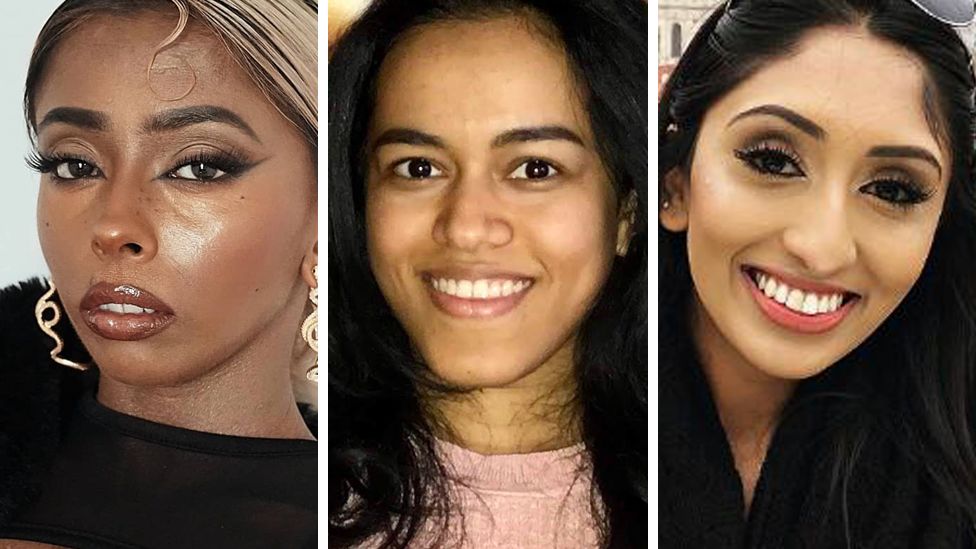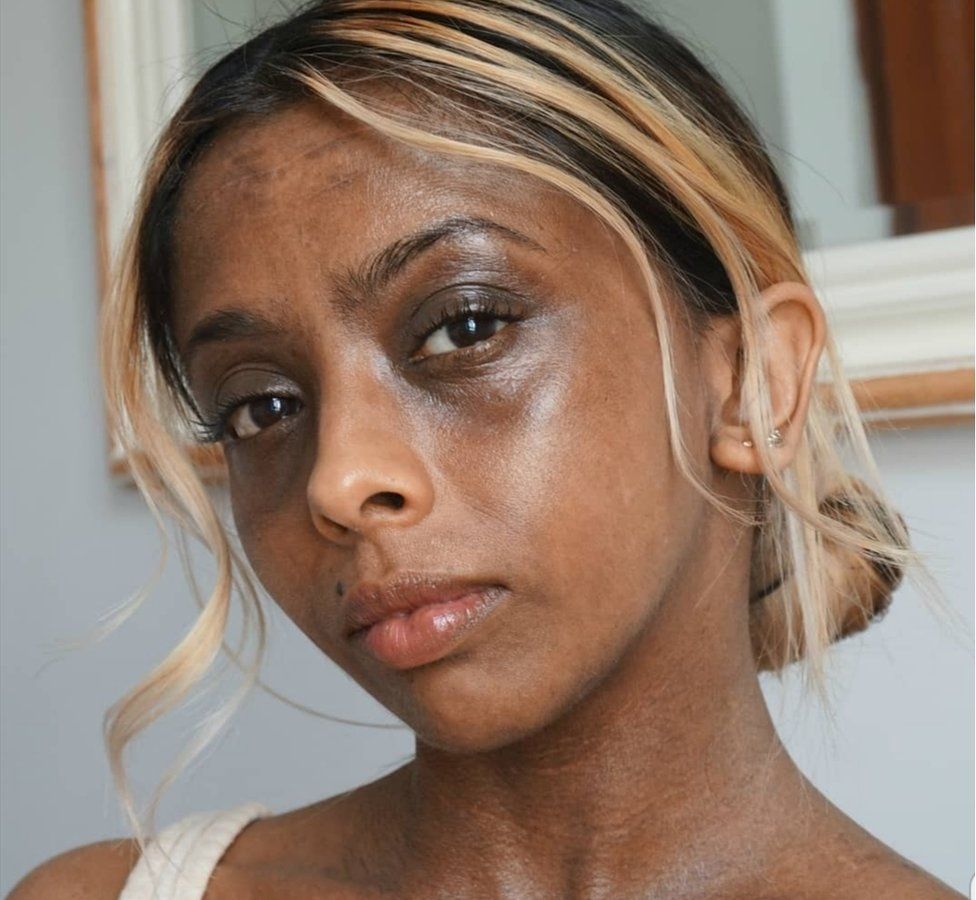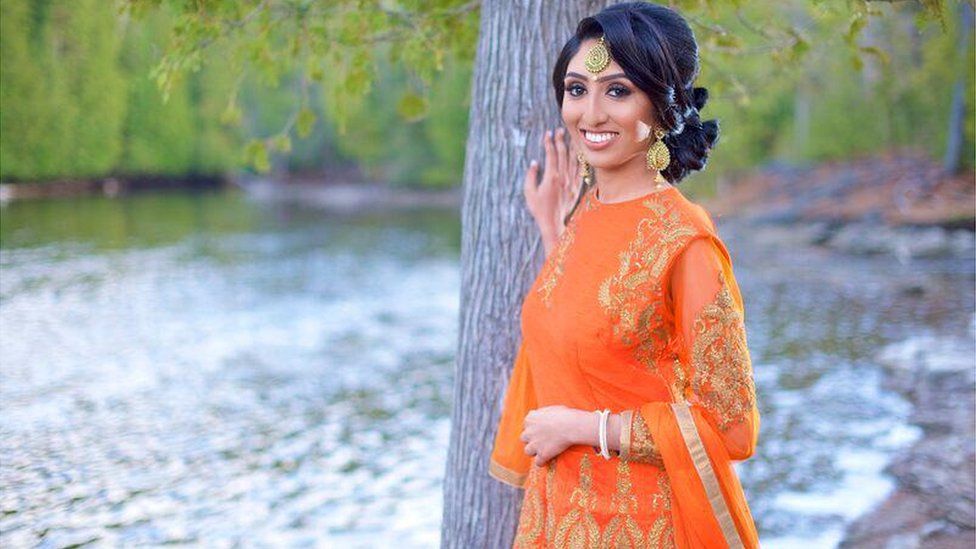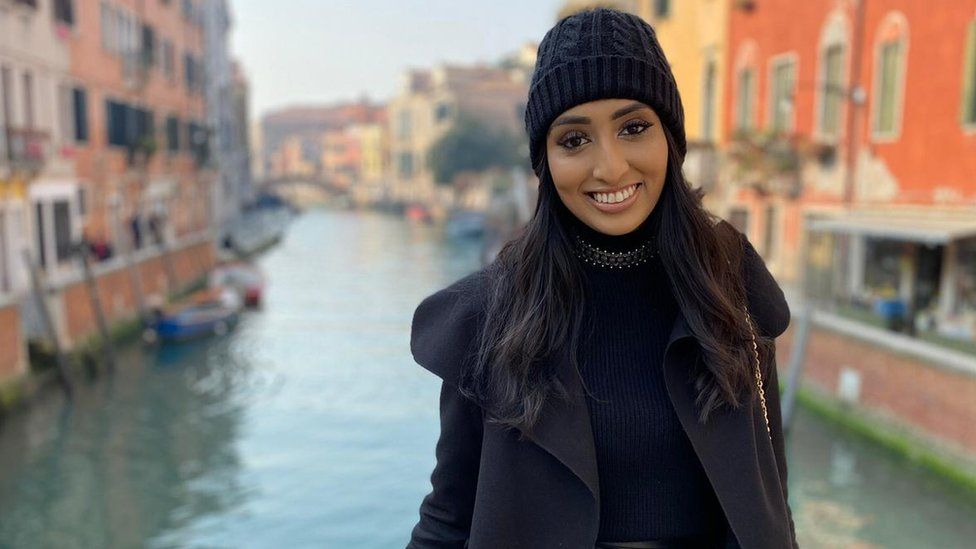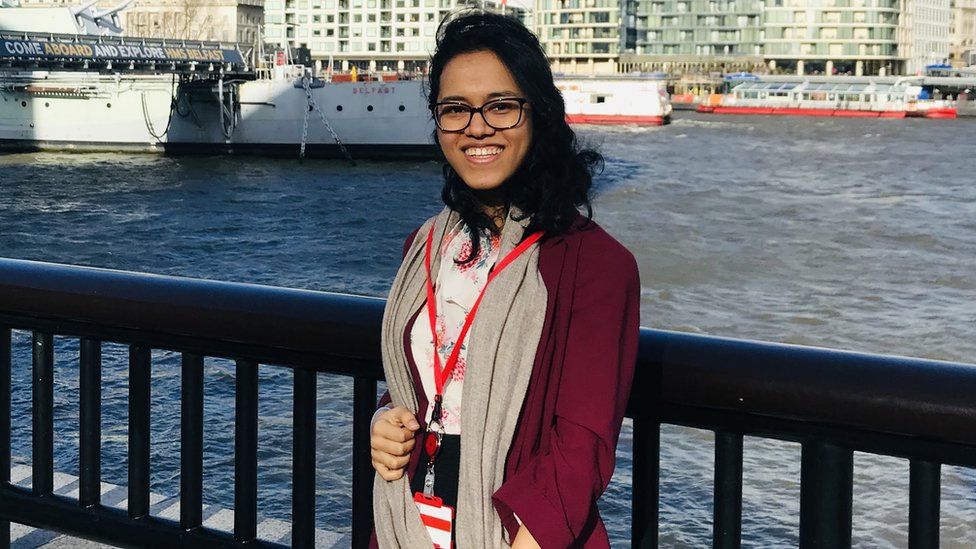Since Singkieland is a dictatorship. Let's use the dictatorship powers to crush such BS garbage. The shitskins are just basically trying to game the system.
'Why I've used skin-whitening products'
By Manish Pandey
Newsbeat reporter
Published5 July 2020
Share
image caption Karishma, Anusha and Sabrina have all used skin-whitening products
"I used to be in the shower and scrub my skin to try and get rid of how dark I was."
Karishma Leckraz started using skin-whitening products aged 13 after being told she'd "be prettier" if she had lighter skin.
"I was told that I have 'such pretty features' - but it's a shame I'm 'so dark'," the 27-year-old tells Radio 1 Newsbeat.
She was introduced to skin-lightening products by her parents - they wanted her to be lighter-skinned.
"It's so deeply rooted in our culture that if you're lighter," Karishma says, "you're so much prettier."
It's South Asian "culture" Karishma refers to - where fairer skin can be regarded as superior.
But in recent weeks, in response to the conversations taking place since George Floyd's death, Unilver has said it will
drop the word "fair" from its skin-lightening cream in India - changing the brand to Glow and Lovely.
And a skin tone filter
has been removed from Asian marriage website Shaadi.com.
image caption Karishma, a freelance make-up artist who uses her personal experience to promote positive messages around skin, says the products she used when she was younger worsened her eczema
'Don't be in the sun for too long'
Like Karishma, Sabrina Manku was told she was too dark by her family.
"As a young girl, it was 'Don't be in the sun for too long.' They would tell us I would get tanned."
They'd say it in Punjabi, which because of how blunt the language can be made it "more hurtful", the 23-year-old adds.
It was aged 10 that Sabrina was first introduced to fairness cream - which she used for eight years.
image caption Sabrina studies law at the University of Leicester and says she "became more confident over time with my skin and features".
And it's not just comments by family members that can cause people to desire lighter skin.
For Anusha, who didn't want to give her full name, it was her teenage years at school that led to "really negative" thoughts about her skin tone.
"I found myself making unhealthy comparisons about the way I look with people who have lighter skin."
"The most popular girls would get different treatment for no reason other than the fact they are five shades lighter."
Karishma even stopped taking photos with her friends as a teenager.
"I didn't want it to come out in the photo that I was darker," she says.
Colourism in South Asian communities
Colourism is a prejudice or discrimination against individuals with a dark skin tone, typically among people of the same ethnic group.
Colonialism has had an impact, with lots of the invasions "done by people who were usually lighter skin, like the British", says Dr Ritumbra Manuvie, who teaches human rights law and has researched discrimination in South Asia.
"That ingrained a thought that if you're lighter, you're somehow superior."
The caste system - a complex social hierarchy system - has furthered the idea of lighter being better in society.
"Those in the higher caste or top of the power structure would often be lighter in colour. With marriages, the average requirement is the bride should be fair."
Dr Manuvie adds skin-lightening products and their promotion in popular culture "institutionalised the concept of being fair" in modern times.
"If you look at people in institutions in the earlier days, such as those leading freedom struggles, colour was never really an issue," she says.
'I followed what the celebrities did'
Sabrina points to Bollywood - the Hindi film industry in India - as a major influence on her decision to use skin-whitening products.
"I've looked up to celebrities and followed their trends, whatever they've endorsed."
Bollywood stars have been criticised for advertising products which promote a fairer skin ideal.
"It just makes you feel like you have a darker complexion and using a product will make a difference because celebrities are telling you it will."
Some adverts included men being attracted to women who became lighter-skinned after using a fairness product - after initially being overlooked with darker skin.
image caption "I wanted to go into modelling. I always thought darker skin colour meant I wouldn't get work."
And it's not limited to adverts.
"I've noticed in films, fairer skin is seen as the ideal and more beautiful. I just wanted to look more like the people that I saw on television," Sabrina adds.
'I still use whitening products'
Karishma and Sabrina no longer use skin-lightening products - because of the impact it was having on their skin but also due to increased confidence about their skin tone.
It's not the same story for Anusha.
Family and societal pressure around colourism first caused her to use skin-lightening products, but now it's something else.
"Not every person who buys a whitening product wants to permanently whiten their skin. For me, it gives my skin a more refreshed look if it looks really dull."
Anusha currently uses masks which lighten her skin because "it makes for a clearer canvas to put make-up on or even out skin tone".
image caption Anusha has noticed brands which claim to offer radiance and glow actually have a lightening effect on skin
But she admits that had she not been exposed to whitening products at a young age, she wouldn't be using them now.
"I think using anything that is a whitening product when you're older can be put to family or society pressure for sure."
Anusha says she's "constantly reflecting" about what she buys and if it's right for her skin.
'There's still a way to go'
Karishma says discussions around colourism and the use of products have improved in recent years.
"I've even spoken to family members about it properly now," she says.
While the changing of names of skincare products - like Unilever and L'Oreal have done - may seem like a step forward, it doesn't go far enough for Sabrina.
"I personally believe changing the name of the product doesn't eliminate the product, because we know that it's there. There's still a long way to go," she says.
Karishma adds: "If I could go back, I'd tell my younger self to stop straightaway and not even think about using creams like that.
"I'd tell her to see the beauty in her melanin - and the pigmentation of my skin does not determine how beautiful the person is going to be."
Follow Newsbeat on Instagram, Facebook, Twitter and YouTube.
Listen to Newsbeat live at 12:45 and 17:45 weekdays - or listen back here.





/adorable-white-pomeranian-puppy-spitz-921029690-5c8be25d46e0fb000172effe.jpg)







